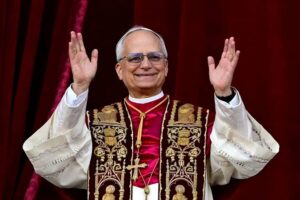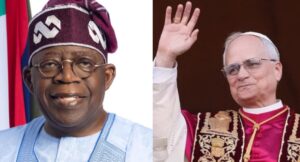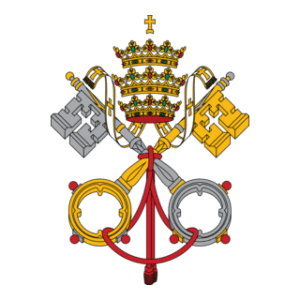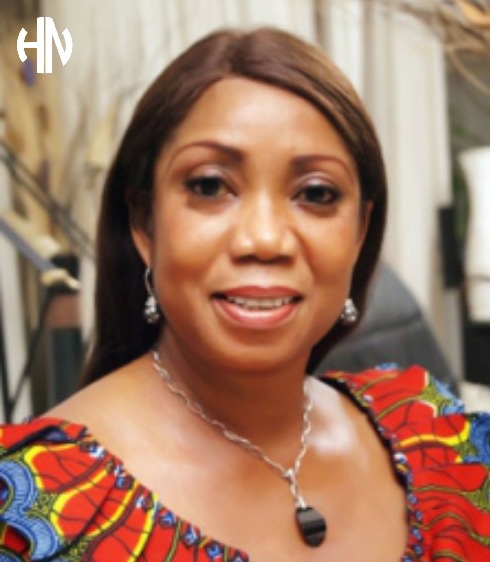By Princess Gloria Adebajo-Fraser, MFR
In a move that has drawn both attention and concern in Abuja and Rome, Pope Leo XIV recently named Nigeria among countries where Christians are being persecuted. This pronouncement comes at a delicate moment in Nigeria–Vatican relations and raises urgent questions about diplomacy, neutrality, and the role of the Catholic Church in a complex national conflict.

Vatican Ties with Nigeria: A Brief Context
Nigeria is Africa’s most populous country and hosts a large Roman Catholic community. In May 2025, President Bola Tinubu made an official visit to the Vatican upon invitation from Pope Leo XIV. In the same period, the Pope appointed a Nigerian priest, Edward Daniang Daleng, OSA, as Vice-Regent of the Vatican’s Prefecture of the Papal Household, a senior administrative post. These developments signaled a deepening of ecclesiastical and diplomatic engagement between Nigeria and the Holy See.

Yet a notable diplomatic gap remains: Nigeria currently has no fully accredited ambassador to the Vatican. That absence has created a dangerous lacuna. In the void, the Holy See is forced to rely on second-hand briefings, lobby-driven narratives and media reports, instead of structured, official intelligence from an envoy whose job is to present Nigeria’s reality in a balanced way. Without a resident ambassador, accurate and timely information is not guaranteed, and misunderstandings become almost inevitable.
The same wider problem affects other key capitals. Nigeria still needs to urgently fill ambassadorial posts in Washington, London, Ottawa and other G7 capitals, where narratives about Nigeria’s security and human-rights situation are being framed daily. Leaving these seats vacant for too long allows others to define Nigeria’s story unchallenged.

The Statement and Its Implications
Recently, Pope Leo XIV publicly listed Nigeria among countries witnessing alleged persecution of Christians. This echoes U.S. congressional inquiries into Nigeria’s human-rights record — including the past designation of Nigeria as a “Country of Particular Concern” (CPC) by the United States. However, several major analysts and independent observers have noted that there is no credible evidence that the violence in Nigeria meets the United Nations’ internationally accepted definition of genocide: a deliberate, systematic attempt to exterminate a protected group.
Crucially, Pope Leo’s earlier posture was more cautious. His staff did not immediately frame Nigeria in terms of genocide or targeted Christian extermination when Western media campaigns and lobbying drove the CPC narrative. A shift now to a broad, categorical statement raises uncomfortable questions:

Is the Pope exercising careful diplomatic judgment, or
Has the Vatican been fed partial, one-sided briefings that exaggerate the religious dimension and ignore the broader insecurity?
The absence of a Nigerian ambassador at the Vatican only makes that second explanation more plausible.
Security Realities in Nigeria: More Complex Than a Single Label
No serious observer disputes that Nigeria faces grave insecurity. Armed groups such as Boko Haram, Islamic State West Africa Province (ISWAP), bandits, ESN/IPOB-linked militants and criminal gangs plague large swathes of the country. Yet Nigeria appears in recent Global Peace Index lists among nations with elevated internal conflict, not as a unique “genocide state”. If a full-blown, state-backed genocide were underway, the ratings, sanctions and global response would be far more severe and categorical than they are today.
In reality, violence has claimed both Christian and Muslim lives across different regions and contexts:
In the North-East and parts of the North-West, jihadist insurgency and banditry target soft civilian populations, Muslims and Christians alike.
In the North-Central (Plateau, Benue and environs), long-running farmer-herder conflicts, communal clashes, land disputes and banditry are often lazily labeled “religious”, even when the primary drivers are economic, territorial and criminal. Religion appears, but usually as a thin overlay, not the core motive.

In the South-East, Catholic parishes and priests have indeed been kidnapped, attacked and killed; churches have been burned or bombed. These are real and heartbreaking tragedies. However, much of this violence is driven by ESN/IPOB-linked networks and criminal gangs, largely made up of Christians attacking fellow Christians for ransom, control and political theatre. Governor Charles Soludo of Anambra State has himself confirmed that in his state Christians are killing Christians and that these acts are inseparable from the wider problem of lawlessness, militancy and criminality.
If the Vatican is being briefed primarily on the raw number of Catholic churches attacked and priests killed, it may be absorbing the correct facts but the wrong conclusion. Yes, Catholic parishes are prime victims in SouthEast Nigeria- Iboland, which is 90% Christian populated. But in Igboland, this is not Muslims exterminating Christians; it is internal insecurity and armed criminality within a predominantly Christian environment.

In other words: it is not genocide; it is chaos.
In the North, a few high-profile incidents where individuals directly insulted Islam or the Prophet triggered mob violence and unjust killings. These crimes must be condemned. But sporadic mob violence, however horrible, is not the same as a central government policy to exterminate Christians as a group.
Importantly, official Nigerian responses have consistently rejected the genocide framing. The Attorney General has stated that while religious-based violence exists, it forms part of a broader, multi-layered security crisis rather than a state-sponsored campaign against a single faith.
Nigeria’s Religious Reality: Intermarriage, Not Apartheid
One crucial element often missing in external narratives is the everyday reality of Nigerian families. In a large majority of households — easily 70–80% in many communities — there are Christian–Muslim intermarriages or close relatives across faiths. It is normal to find siblings, cousins or spouses practising different religions under the same roof.
Even at the apex of power, this reality is on display. President Bola Tinubu is a Muslim; his wife has remained a committed Christian throughout their decades of marriage. Their children include both Muslims and Christians. That is how Nigeria actually lives: faith woven into family, not weaponised into rigid camps.
For this reason, religion in Nigeria has historically united more than it divides. Families celebrate both Eid and Christmas, attend one another’s ceremonies, and share deep social ties across confessional lines. When violence breaks out, it is usually driven by insecurity, crime, politics and local grievances — and only later re-branded by outsiders as “religious persecution”.
This is exactly what Pope Leo XIV needs to understand: a country where faiths are this intertwined at household level is a very unlikely candidate for a top-down, state-backed Christian genocide. What Nigeria is battling is a brutal, multi-dimensional insecurity problem, not a centrally organised campaign to persecute one religion.
Politics, Diplomacy and the Rising Nigerian Profile
Beyond security lies geopolitics. Nigeria is positioning itself for greater independence and global influence — discussing dedollarisation of crude sales, insisting that some transactions (including airline tickets) be denominated in naira, and exploring deeper ties with China, Russia, Brazil and others. In such a context, pressure often comes wrapped in moral or religious language.
Could the “Christian persecution” narrative be, at least in part, a political tool — a way to stigmatise a rising, more independent Nigeria? That possibility cannot be dismissed. All the more reason why Nigeria cannot afford vacant embassies in key capitals or silence when powerful voices like the Pope speak on incomplete information.
The Vatican’s Role: Neutrality or Advocacy?
According to the principles of the Holy See’s diplomacy and the spirit of canon law, the Vatican is expected to act as a neutral, moral actor, careful in speech, rooted in verified evidence, and attentive to the full complexity of conflicts. Ecclesiastical pronouncements on political and security matters are supposed to be:
Fact-based
Even-handed
Guided by a commitment to truth and reconciliation
Past popes like Benedict XVI and Francis generally favoured visiting conflict regions, listening to multiple sides, and calling for inquiry rather than issuing blunt, one-sided denunciations. Their method was simple: consult the facts, encourage dialogue, avoid premature judgment.
Measured against that standard, Pope Leo XIV’s statement on Nigeria feels premature and unbalanced. It appears to rest heavily on the undeniable suffering of Catholics and other Christians, but without proper appreciation of how much of the killing is being done by other Christians or criminal groups in Christian-majority zones, and how many Muslims are also victims in the North.

The Holy See should not equate “many Christian victims” with “Christian genocide” without meeting the legal, moral and factual threshold for that word.
Why This Matters for Nigeria
For Nigeria’s pluralistic society — where inter-marriages between Christians and Muslims are normal, where many families host both faiths under one roof, and where religious festivals overlap rather than clash — a Vatican statement can:
Deepen suspicion and polarisation if misread internationally
Undermine Nigeria’s attempts to explain its complex security situation
Embolden external actors who want to weaponise the “genocide” label against Nigeria
For the Tinubu administration, the statement opens a new front at a time of intense domestic economic and security pressure. For Nigerian Catholics, the honour of having a compatriot in a senior Vatican post risks being overshadowed by a growing perception that Rome is listening more to select narratives than to the full Nigerian reality — including the reality that religion often bonds Nigerian families together rather than tears them apart.
What Should Happen Next?
● The Vatican should initiate or support a rigorous fact-finding mission in Nigeria, engaging state authorities, Catholic bishops, other Christian leaders, Muslim leadership and neutral experts before making categorical claims about genocide or persecution.
● Nigeria must urgently fill key ambassadorial posts — not only at the Holy See, but in Washington, London, Ottawa and across the G7. Leaving these critical diplomatic seats empty is an open invitation for hostile or misinformed narratives to harden into official positions without rebuttal.
● The Catholic Bishops’ Conference of Nigeria and responsible civic groups, including the National Patriots Movement, should respectfully petition Pope Leo XIV to review or clarify his statement in light of:
the lack of established genocide evidence,

the internal Christian-on-Christian violence in the South-East,
the shared suffering of Muslims and Christians in many regions, and
the deeply interwoven, intermarried religious structure of Nigerian society.
● True diplomatic and pastoral dialogue must replace headline-driven narratives. The Vatican’s moral authority is strongest when it promotes unity, truth and reconciliation — not when it inadvertently reinforces a partial, politicised story.
Conclusion
Pope Leo XIV’s decision to list Nigeria among countries of alleged Christian persecution is a serious and consequential escalation. In the tapestry of Nigeria’s security crisis, the dominant threads are insurgency, banditry, separatist violence and criminality. These threads cut across religious lines and claim victims on all sides, often within the same extended families.
To frame Nigeria as a straightforward case of Christian genocide is to oversimplify a complex tragedy, risk diplomatic damage and distort pastoral responsibility. The Vatican must live up to its long-held vocation as a neutral arbiter of justice and truth, not a platform for untested labels.
It is time for the Church in Rome to stand not only with the victims, but also with the facts — and for Nigeria to respond with transparency, engagement and a fully functional diplomatic corps. Only then can trust be restored, without playing politics with real suffering.
Princess Gloria Adebajo-Fraser, MFR
National Patriots Movement




